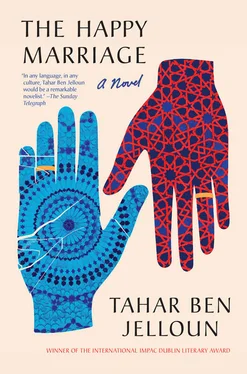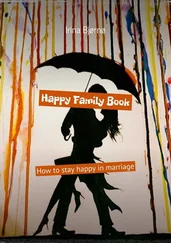At the time, Foulane was all sweetness and light, always very attentive, cheerful, and loving. He always wanted to please me, and he’d rush to the other side of the town just to buy me a present. He’d put an end to his former days as a bachelor and ladies’ man. But there were still traces of that former life in his apartment. A bra, a nightgown, designer shoes. I threw them in the neighbor’s trash the first chance I got. Foulane didn’t even realize that they’d gone missing. Or if he did he never mentioned it.
I found hundreds of photos in one of his drawers. Some were related to his work, but others depicted him in the arms of other women: blondes, redheads, brunettes, tall, short, Arab girls, Scandinavian girls … “What kind of a hole have I gotten myself into?” I asked myself. “Why me? What do I have that they don’t? Oh, I get it now, the guy’s pushing forty and so he’s decided to listen to his mother and have kids, so I’m going to be his surrogate mother. Until he eventually trades me in for a younger woman.”
My parents were very traditional. The marriage took place in the village hall. Once they’d arrived — late, of course — Foulane’s family was completely shocked, especially the women. How could their son — the famous artist — possibly get married in a rented room just like immigrants did when they returned home? They exchanged knowing glances of the kind I would have to endure for years, then pulled some grimaces and went to greet my mother and my aunts. The men assembled on the other side of the room, where the adel was going to preside over the signing of the marriage contract. Foulane was wearing a white djellaba with slippers that kept falling off his feet; he was embarrassed and ill at ease. He felt that the union of those worlds was a losing combination. He was sorry about it, sorry about the fact his relatives were racists, sorry that my relatives weren’t well educated, sorry that I belonged to a tribe that didn’t know the kind of good manners that the people of Fez were accustomed to, because in their eyes our good manners weren’t all that good.
I must admit that the dresses his female relatives wore — his mother, his aunts, his sisters — were incredibly beautiful and expensive. Our own dresses were no match for theirs. We were of humble stock, yes, but we were also proud. What did we have to be ashamed of? Of being who we were? Never. I don’t think Foulane ever understood this character trait that was shared by all members of our tribe. We were incredibly proud. We had our dignity and our honor. All their pomp didn’t make our heads spin.
The time came for the signing of the marriage contract. I had to say “yes” and then sign it. We were kept in different rooms. A door stood between us. I clenched my mother’s arm until it hurt her, and I cried like a little girl whose doll had been stolen from her. I saw Foulane’s father grimace as though to indicate his disapproval. One of his friends kept tugging at his sleeve to remind him not to make a scene. I would have really liked him to. It would have saved me, and frankly it would have also saved his son.
I wiped my nose, dried my tears, and whispered, “Yes.” I had to say it again, then I covered my head and signed the certificate of my slavery, confinement, and humiliation.
The men prayed for the groom and the bride to be blessed by God and His Prophet, to keep them on the right path, to retain their faith, and for their souls to be cleansed of all impurities, and for them to be worthy of the happiness that God had in store for them!
Then they raised their hands to the heavens and began to recite verses from the Qur’an, then exchanged greetings amongst one another, with each family wishing the other a happy and prosperous life.
Our village orchestra played a selection of songs that belonged to our heritage. My relatives started to sing and dance, while his remained trapped inside their fine clothes. One of his aunts motioned me to come over to her and said: “Why have they been playing the same song over and over again?” How could I explain that the musicians had played at least twenty different songs? She then ordered me to sit beside her and said: “Do you know whom you’ve had the privilege to marry? Do you know what kind of family you’ve become a part of? Why can’t you speak Arabic properly and what’s up with that accent? Are you Moroccan or half French? Very well, you must come stay with us in Fez so that I can teach you how to cook, how to comport yourself, and how to address people when they speak to you.”
I was stupefied. I burst into laughter, nervous laughter. I laughed until I started to cry, not knowing whether they were tears of happiness or sadness. Repressed anger. Subdued wrath. I didn’t answer her but kept my gaze fixed on the floor, like a mad, distraught woman.
Dinner was served late. The women didn’t like our cooking. The plates had been barely touched by the time they were sent back to the kitchen. The men ate as normal. My father, who hadn’t had the time to change, was exhausted. My mother, poor thing, was very unhappy. My aunts stared at me as if to say, “Serves you right!” I observed my husband from afar and noticed how unhappy he looked. He wasn’t smiling and wasn’t eating. Maybe he wanted to run away. He would have done us a great service if he had. He came to take me away at around four o’clock in the morning, as per our custom. His friend dropped us off at our hotel. The room was a mess. There weren’t any flowers, no chocolates and no greeting card. This time it wasn’t Foulane’s fault, but rather that of the hotel, which didn’t deserve its five stars. Our wedding night had begun with bad omens. There were even cigarette butts floating in the toilet bowl. But who could we talk to at that hour? Foulane sent the hotel manager a fuming letter the following day. The party was over. In fact, there had never been a party in the first place, just a ceremony that we had to fulfill out of a sense of duty.
A photographer friend had spent the entire evening taking shots of us. My husband had some of them enlarged. We hung them up in the living room of our first apartment in Paris. The people who came to visit us would look at them transfixed: “Oh, it’s like One Thousand and One Nights ! How pretty the bride looks! How young! You look ravishing, darling, why didn’t you invite us? What a shame! A big Moroccan wedding! What a party it must have been! And how happy you look!”
Nobody knows how to really read a photograph. How badly I’d wanted to tell those people: “But you’re completely wrong! It wasn’t a party, just a chore where everyone was uncomfortable, unhappy, and outside their comfort zone, which was celebrated to the sounds of Berber drums and flutes, which it turns out was a mistake, a monstrous mistake. What you can see in our eyes is a profound sadness, deep regret, and a crushing sense of fatality.”
We always gave people the impression we were a happy couple. Those who didn’t know us well held us up as an example of a model couple. I suffered under the weight of this impression, which bore no relation to reality. My husband acquired the habit of shutting me up whenever we had guests over. He behaved toward me in a way that he would never allowed himself to do with anyone else. One day, when he’d been entertaining his nieces and their husbands, he’d had the insolence to translate my words into “proper French,” adding that he always had to provide subtitles for whatever I said! At which point his guests had laughed, amused by the way he treated me, and I just let him to do it, like the fool I was.
On another occasion, he told an English painter who was represented by the same gallery that he never took me abroad because he loved to travel free and without any luggage, that he didn’t want to be encumbered by a wife who would doubtless have caused him a thousand problems. The painter had been confused by why Foulane would feel the need to talk about me like that, but since Foulane had given his words a comedic inflection, he’d limited himself to a polite laugh. Then there had been the time when a musician friend of his had come to see us to tell us he’d gotten married, at which point Foulane had cracked a few stupid jokes about marriage and quoted Schopenhauer’s gloomy aphorisms on the subject.
Читать дальше












